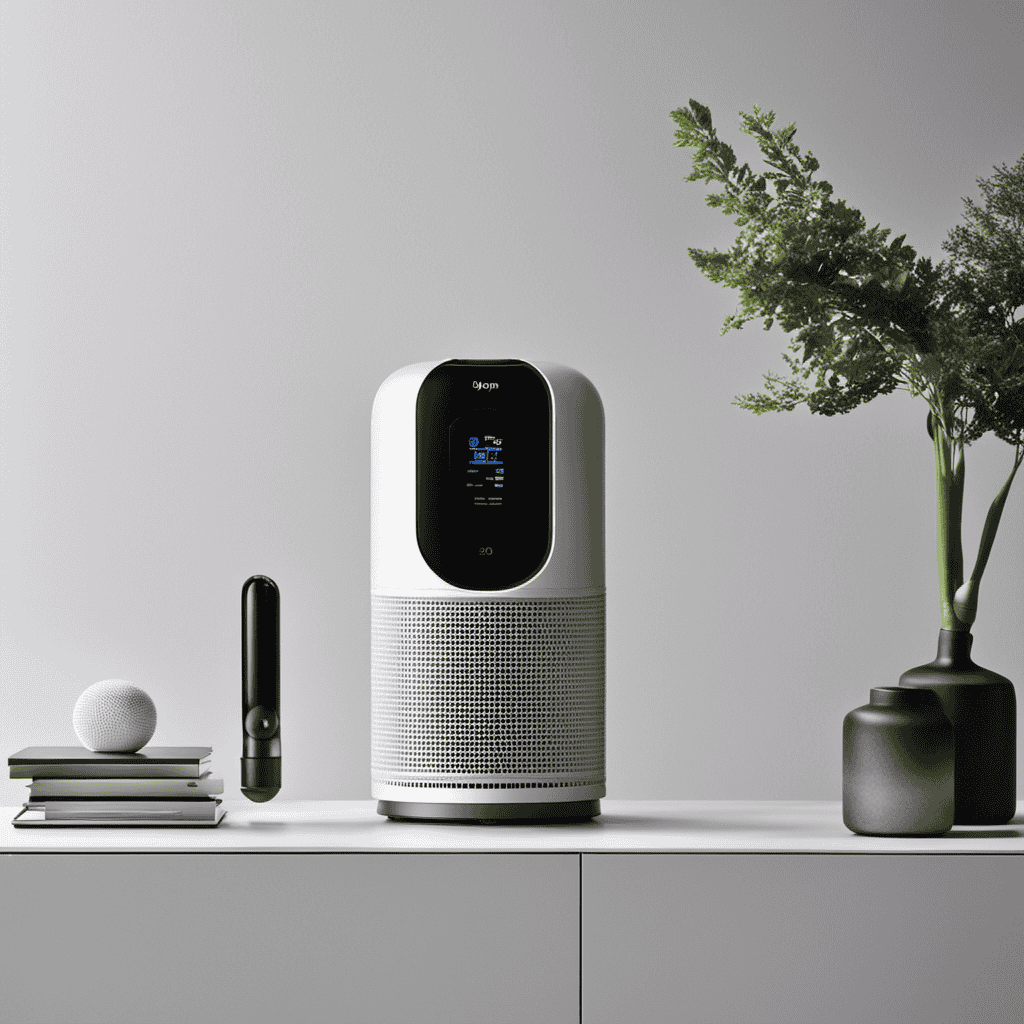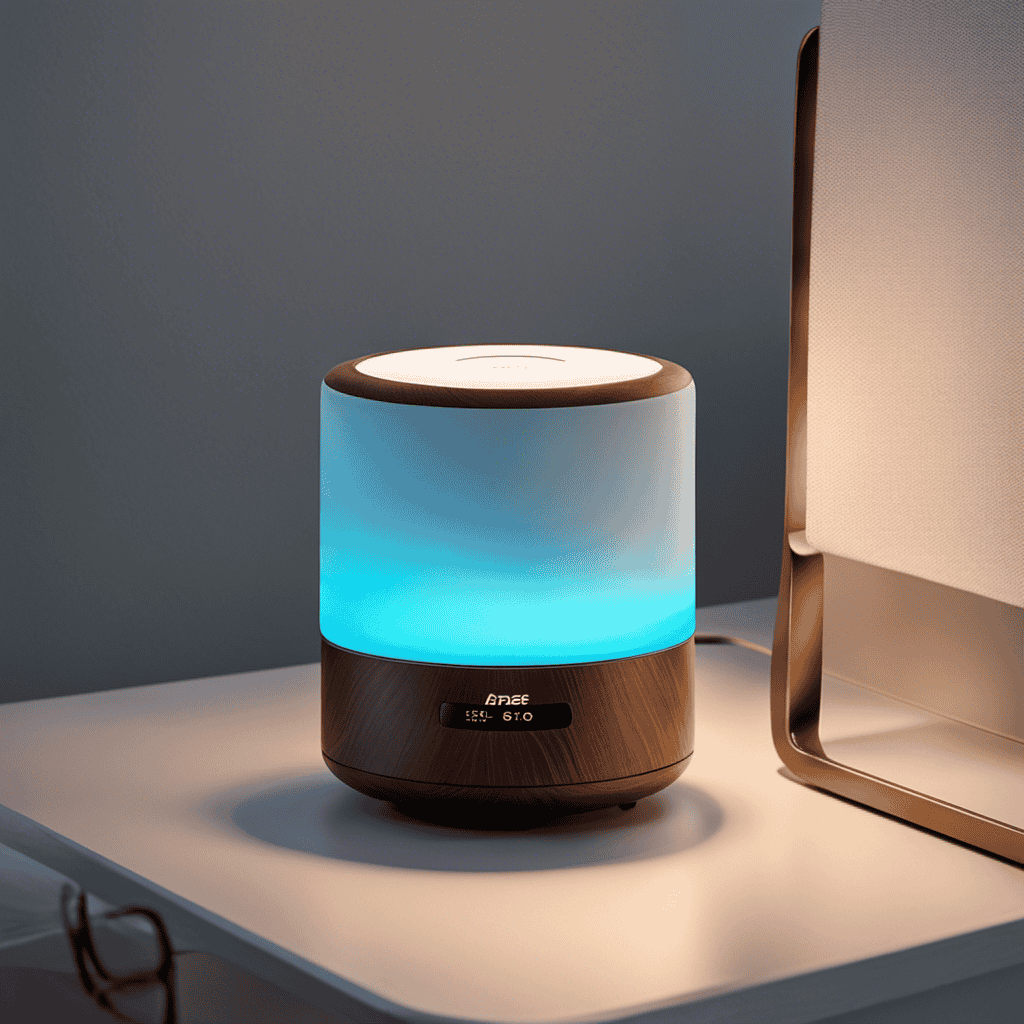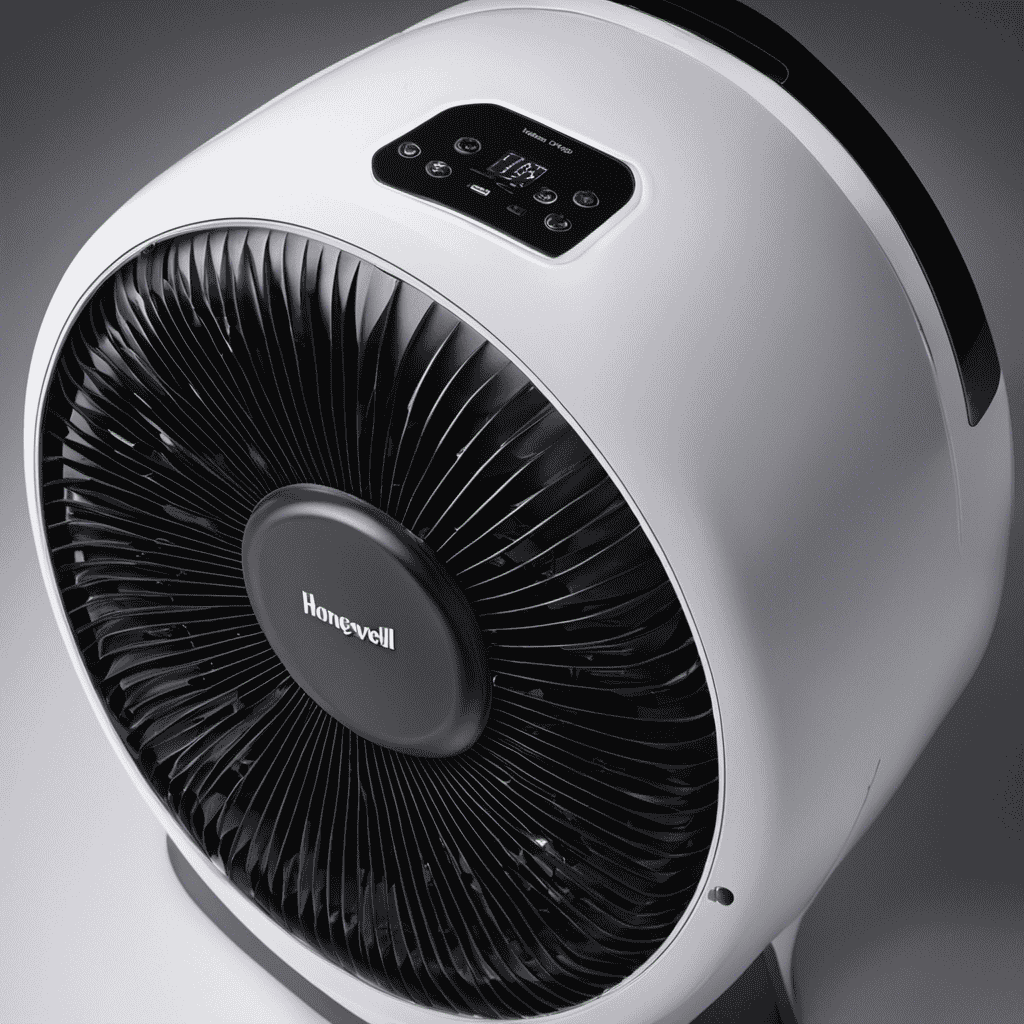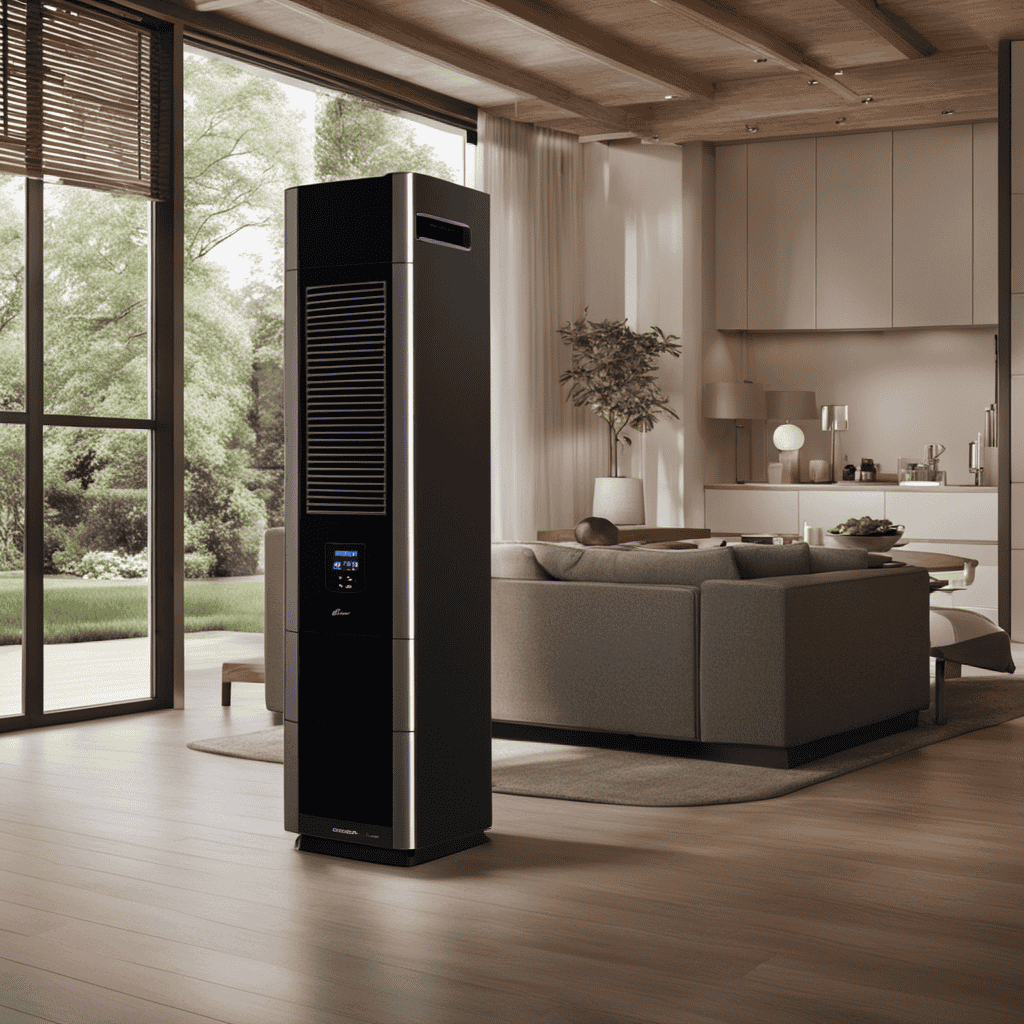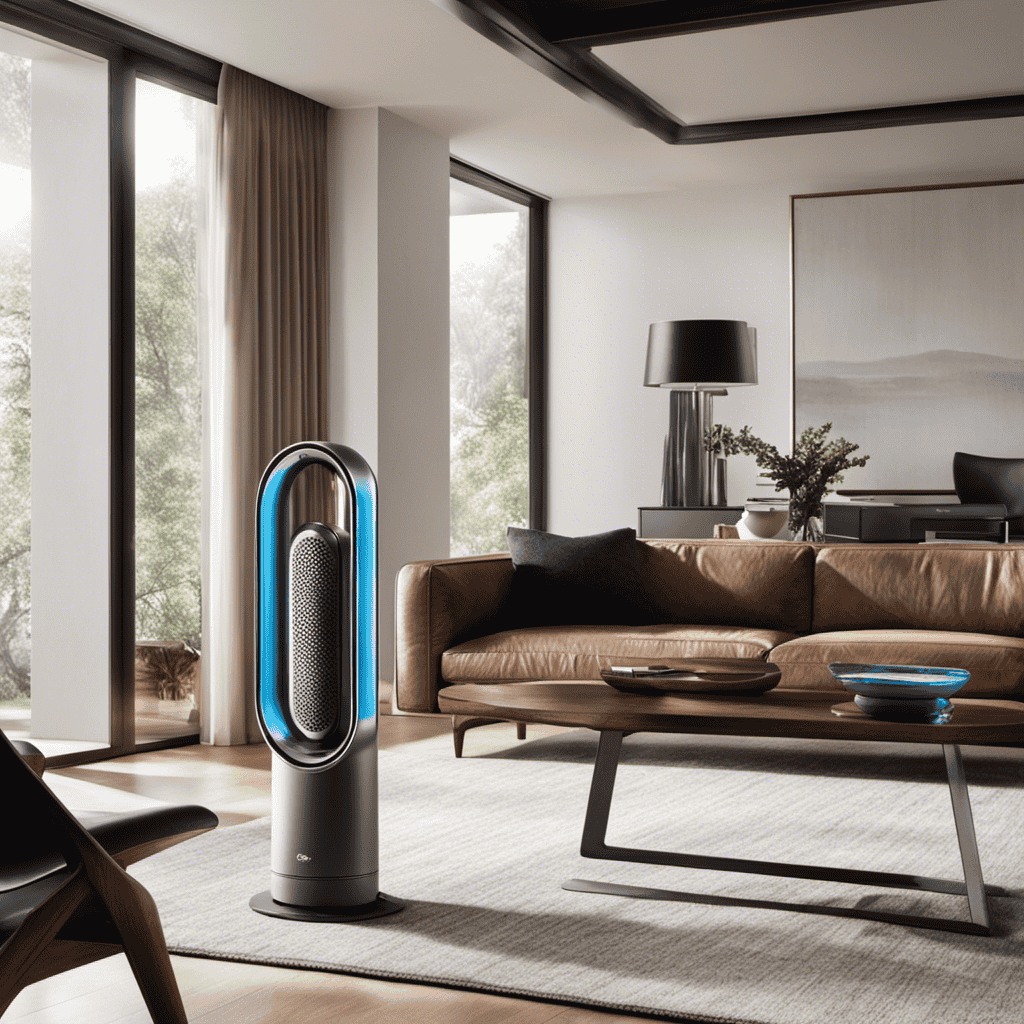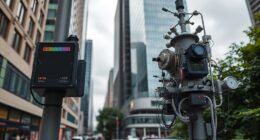As the owner of a Dyson air purifier, I frequently ponder: What is the lifespan of the filter? Let me assure you, my friend, it’s a question worth investigating.
In this article, we’ll delve into the factors that affect the lifespan of a Dyson air purifier filter, discuss the average duration before replacement is needed, and highlight the telltale signs that it’s time to make a change.
So, grab your notepad, because we’re about to dive deep into the world of Dyson air purifiers and their trusty filters.
Key Takeaways
- The lifespan of a Dyson Air Purifier filter is affected by factors such as air quality, frequency of use, size of the purifier, and regular maintenance.
- The average duration before a Dyson Air Purifier filter needs replacement depends on air quality, usage of the purifier, regular maintenance and cleaning, and the benefits of regular maintenance in terms of energy efficiency and longevity of the device.
- Signs indicating the need to change the Dyson Air Purifier filter include filter replacement indicators, visual or audible notifications, tracking usage and air pollution levels, alternative methods for filter replacement, and decreased air purification effectiveness.
- To maximize the longevity of the Dyson Air Purifier filter, proper cleaning techniques such as gently tapping the filter, using a soft brush or low-pressure vacuum cleaner, and rinsing the filter with cold water should be followed, while avoiding hot water or harsh chemicals.
Factors That Affect the Lifespan of a Dyson Air Purifier Filter
You might be wondering what factors can affect the lifespan of your Dyson air purifier filter. Well, let me tell you, there are several key factors that can impact the efficiency and longevity of your filter.
One of the most important factors is the air quality in your environment. If you live in an area with high levels of pollutants, such as dust, allergens, or smoke, your filter will have to work harder and may not last as long.
Additionally, the frequency of use and the size of your purifier can also affect the lifespan of the filter. It is recommended to regularly clean and maintain your filter to ensure optimal performance and longevity.
Regular maintenance, such as vacuuming the filter or replacing it when necessary, can greatly extend its lifespan and improve its efficiency. So, don’t forget to give your Dyson air purifier filter the care it deserves for long-lasting and effective performance.
Average Duration Before a Dyson Air Purifier Filter Needs Replacement
When using a Dyson air purifier, it’s important to be aware of how frequently the filter needs to be replaced. The lifespan of a Dyson air purifier filter can vary depending on several factors.
Factors affecting filter lifespan:
- Air quality: Filters may need to be replaced more frequently in areas with higher levels of pollutants.
- Usage: Filters may wear out faster if the purifier is used for longer periods or in larger spaces.
- Maintenance: Regular cleaning and maintenance can extend the lifespan of the filter.
Benefits of regular maintenance:
- Improved air quality: Regularly replacing the filter ensures that the purifier continues to effectively remove pollutants from the air.
- Energy efficiency: A clean filter allows the purifier to operate more efficiently, saving energy.
- Longevity of the device: Proper maintenance can prolong the overall lifespan of the air purifier.
Signs That Indicate It’s Time to Change the Dyson Air Purifier Filter
When it comes to maintaining optimal air purification performance, it is crucial to pay attention to filter replacement indicators. These indicators serve as a helpful tool in determining when it’s time to change the filter in your Dyson air purifier.
Ignoring these indicators can lead to decreased air purification effectiveness, as the filter becomes clogged with pollutants and is unable to efficiently capture airborne contaminants.
Filter Replacement Indicators
The Dyson air purifier’s filter replacement indicators are designed to let you know when it’s time to change the filter. These indicators monitor the lifespan of the filter and provide a visual or audible notification when it needs to be replaced.
The filter lifespan indicators work by tracking the amount of usage and the level of air pollution in your environment. They use advanced sensors and algorithms to calculate the optimal time for filter replacement based on these factors. This ensures that you always have clean and purified air in your home.
While the filter replacement indicators are very accurate, there are also alternative methods to determine when to replace the filter. These include monitoring the airflow, checking the filter for visible dirt or discoloration, or following the manufacturer’s recommended filter replacement schedule.
However, relying solely on these methods may result in decreased air purification effectiveness.
Decreased Air Purification Effectiveness
Relying solely on alternative methods to determine filter replacement may result in decreased air purification effectiveness. Regular filter replacement is crucial for maintaining good air quality and ensuring optimal performance of your air purifier. Research has shown that filters gradually become less effective over time as they accumulate dust, allergens, and other pollutants. Without proper maintenance and timely replacement, these particles can clog the filter and hinder its ability to capture airborne contaminants. This can lead to decreased air purification effectiveness, allowing harmful pollutants to circulate in the air and potentially compromising your health.
It is important to understand that prolonged exposure to contaminated air can have serious health implications. Therefore, it is essential to follow manufacturer guidelines and replace filters regularly to ensure efficient air purification and maintain a healthy living environment.
Tips to Maximize the Longevity of Your Dyson Air Purifier Filter
When it comes to maximizing the longevity of your Dyson Air Purifier filter, there are three key points to keep in mind.
First, it is essential to use proper cleaning techniques to ensure the filter remains in optimal condition.
Regularly replacing the filter is also crucial, as this helps maintain its effectiveness.
Lastly, avoiding excessive usage of the air purifier can help preserve the filter and extend its lifespan.
Proper Cleaning Techniques
To keep your Dyson air purifier filter in good condition, it’s important to follow proper cleaning techniques. Here are some tips to help you maintain your filter effectively:
- Gently tap the filter to remove excess dust and debris.
- Use a soft brush or low-pressure vacuum cleaner to remove stubborn dirt.
- Rinse the filter under running water, making sure to use cold water and avoid using any cleaning agents.
Proper cleaning methods are crucial to ensure that your filter continues to function optimally. However, it’s important to avoid common mistakes in filter cleaning, such as using hot water or harsh chemicals, as these can damage the filter material.
By following these proper cleaning techniques, you can prolong the lifespan of your Dyson air purifier filter and maintain its efficiency in purifying the air in your home.
However, regular filter replacement is also essential to ensure the continued performance of your air purifier.
Regular Filter Replacement
In my research on Dyson air purifiers, I have found that regular filter replacement is essential for maintaining optimal performance and air quality. While proper cleaning techniques can help extend the lifespan of the filters, they will eventually need to be replaced.
Frequent maintenance, such as vacuuming the pre-filter and washing the HEPA filter, can help prolong their effectiveness. However, it is recommended to replace the filters every 6 to 12 months, depending on usage and air quality conditions.
Dyson offers replacement filters for their air purifiers, ensuring that you can continue to enjoy clean and purified air in your home. By regularly replacing the filters, you can ensure that your Dyson air purifier continues to provide you with clean air for an extended period of time.
Avoiding Excessive Usage
Avoiding excessive usage of your Dyson air purifier can help prolong the lifespan of the filters and maintain optimal performance. Using the Dyson air purifier in different rooms can have varying impacts on the filter lifespan.
The air quality in each room determines how quickly the filters become saturated with pollutants and need to be replaced. Rooms with high levels of dust, pet dander, or smoke may require more frequent filter replacements compared to rooms with cleaner air.
By using the air purifier strategically and only when necessary, you can reduce the strain on the filters and extend their lifespan. This not only saves you money on filter replacements but also ensures that your air purifier continues to effectively clean the air in your home.
Now, let’s explore how to properly clean and maintain a Dyson air purifier filter.
How to Properly Clean and Maintain a Dyson Air Purifier Filter
Cleaning and maintaining a Dyson Air Purifier filter is essential for optimal performance. Proper storage and regular maintenance are key to ensuring the longevity of the filter.
One common mistake people make is neglecting to clean the filter regularly. Over time, dust and debris can accumulate, clogging the filter and reducing its effectiveness. To clean the filter, gently tap it to remove any loose particles, then rinse it under cold water until the water runs clear. Allow the filter to dry completely before reinstalling it.
Another mistake is using harsh cleaning agents or submerging the filter in water, which can damage the filter. By avoiding these common filter maintenance mistakes and following the proper cleaning techniques, you can extend the lifespan of your Dyson Air Purifier filter.
Now, let’s compare the lifespan of Dyson air purifier filters with other brands.
Comparing the Lifespan of Dyson Air Purifier Filters With Other Brands
When comparing Dyson air purifier filters with other brands, you’ll find that their lifespan is significantly longer. This is a crucial aspect to consider when purchasing an air purifier, as it directly affects the cost and maintenance required.
Dyson filters are designed to last for up to 12 months, while filters from other brands may need to be replaced every 3 to 6 months. This longer lifespan not only saves you money in the long run but also reduces the hassle of frequently replacing filters.
Customer reviews often praise Dyson for their durable filters, noting their effectiveness in trapping and removing pollutants from the air. Considering the cost comparison and positive customer reviews, it is clear that Dyson air purifier filters are a reliable and cost-effective choice.
Conclusion
After extensive research and analysis, it’s safe to say that the lifespan of a Dyson air purifier filter is truly remarkable. It lasts longer than you can possibly imagine, defying all expectations.
The signs indicating the need for replacement are few and far between, thanks to the exceptional durability of Dyson filters. By implementing simple maintenance techniques and cleaning methods, you can stretch its longevity even further.
When compared to other brands, Dyson air purifier filters reign supreme in terms of durability and longevity.
